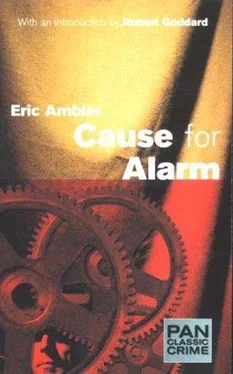Eric Ambler - Cause for Alarm
Здесь есть возможность читать онлайн «Eric Ambler - Cause for Alarm» весь текст электронной книги совершенно бесплатно (целиком полную версию без сокращений). В некоторых случаях можно слушать аудио, скачать через торрент в формате fb2 и присутствует краткое содержание. Жанр: Криминальный детектив, на английском языке. Описание произведения, (предисловие) а так же отзывы посетителей доступны на портале библиотеки ЛибКат.
- Название:Cause for Alarm
- Автор:
- Жанр:
- Год:неизвестен
- ISBN:нет данных
- Рейтинг книги:3 / 5. Голосов: 1
-
Избранное:Добавить в избранное
- Отзывы:
-
Ваша оценка:
- 60
- 1
- 2
- 3
- 4
- 5
Cause for Alarm: краткое содержание, описание и аннотация
Предлагаем к чтению аннотацию, описание, краткое содержание или предисловие (зависит от того, что написал сам автор книги «Cause for Alarm»). Если вы не нашли необходимую информацию о книге — напишите в комментариях, мы постараемся отыскать её.
Cause for Alarm — читать онлайн бесплатно полную книгу (весь текст) целиком
Ниже представлен текст книги, разбитый по страницам. Система сохранения места последней прочитанной страницы, позволяет с удобством читать онлайн бесплатно книгу «Cause for Alarm», без необходимости каждый раз заново искать на чём Вы остановились. Поставьте закладку, и сможете в любой момент перейти на страницу, на которой закончили чтение.
Интервал:
Закладка:
“Mr. Marlow, you are engaged in selling shell-production machinery to Italy. I, as I have already told you, am a Yugo-Slav. I am empowered to say that my Government would be interested in receiving from you details of all your transactions with Italian firms, and would be prepared to recognise your personal efforts in the matter with a retaining fee of at least two thousand lire a month. The details you would be asked to furnish would be of the simplest. You would, as I have explained, be expected to do nothing calculated to prejudice the interests of your employers. All we should require would be the details of the machines supplied; their nature, their production capabilities and their destination. Nothing more.”
“And you are prepared,” I said steadily, “to pay two thousand lire a month for just that? It seems rather a lot of money for so small a service, General Vagas.”
He made an impatient gesture. “What might seem unimportant to you, Mr. Marlow, might be of great value to a military intelligence department. That is because you know nothing of such matters. It is of vital importance to the military and naval authorities of every power to know precisely the potential aggressive and defensive capabilities of every other power. That is a commonplace. It is a recognised need. Every country appoints military and naval attaches to its embassies and legations abroad. The collection of information is their official function. But consider this, Mr. Marlow. Where do these attaches obtain their information? Where else but from the very persons whose business it is to conceal it? The obtaining of accurate military intelligence concerning the resources of a possible enemy is a routine precaution essential to national security. Are we to accept what that possible enemy chooses to tell our attaches officially? Obviously that is absurd. We must make other arrangements. We must buy the information where we can. That is all. You can depend upon it, Mr. Marlow, that we only buy what we need.”
I said nothing. He went on.
“Again, should there still be any doubt in your mind as to the propriety of your supplying a third party with this very harmless information, let me draw your attention to this fact. During the past nine months Messrs. Spartacus have enjoyed steadily increasing prosperity in this country. They have received more orders from Italy than ever before. Yet, until Mr. Ferning’s unfortunate accident, we were in regular receipt of the information I am asking you for now. Look at it another way. If I cared to employ experienced agents for the purpose, I could secure this information quite independently. We could secure it, but it would simply be less convenient to do so by those means and more expensive. You see the idea? You would be paid, in effect, not for supplying us with a series of comparatively commonplace facts, but for saving us the trouble and expense of obtaining them elsewhere. You see, Mr. Marlow? Tell me frankly what you think.”
I was silent. A log settled down in the grate. I could hear a clock ticking. So that was it. That was the proposition that Zaleshoff had wanted me to hear, the proposition that he thought might interest me.
“Well, Mr. Marlow?”
“This is a very unusual proposition, General,” I said stupidly.
“Not so unusual as you might think, Mr. Marlow,” he said calmly. “But let me assure you that there is nothing in it to which even the most sensitive conscience could object. It would be a simple matter of business, a confidential routine arrangement between two men of honour.”
I stood up. “Yes, I quite see that. I take it, then, that you would have no objection to my referring the proposal to Mr. Pelcher, my managing director, for sanction to discuss the matter further with you?”
He fingered his lower lip. “I could scarcely counsel that course, Mr. Marlow. While any private arrangement we made together would be no concern of your company, to put the matter on an official footing would certainly embarrass your director. It would involve for him a question of honour. Rightly or wrongly, he would feel that he had an obligation of discretion to fulfil as far as his clients were concerned.”
“And you don’t think that I, as a representative of the Spartacus company, have a similar obligation?”
“As you pointed out yourself, Mr. Marlow, your position is, in a sense, impersonal. You accept no responsibility for the nature of your company’s activities. You do not, rightly, permit instincts of loyalty to your country to interfere with business. Why should you allow a vague sense of loyalty to your company to confuse your mind?”
“My company purchases my loyalty by paying me to represent it.”
“I see. And your country does not pay you.” There was no mistaking the sneer in his voice. I felt myself losing my temper.
“I’m afraid that I cannot accept your interpretation of the circumstances. I have only your word for it that any question of loyalty to my country does actually arise.”
“Do you doubt my word, Mr. Marlow?”
“No, but I think you may be a trifle prejudiced.”
“Your predecessor, Mr. Ferning, did not think so.”
“Possibly not.” I glanced at my watch. “I think, General, that I ought to be going. It is past midnight and I have to be up early. Thank you for a very pleasant evening.”
He got to his feet.
“Another brandy before you go?”
“Thank you, no.”
“As you please. With regard to this matter of business, Mr. Marlow.” He rested his hand on my shoulder. “Don’t decide too hastily. Think it over. Naturally, I don’t want you to do anything that causes you the least uneasiness. But I think you will see that I am right.”
The candlelight was reflected for an instant in his monocle. His hand patted my shoulder paternally. I wanted to shake it off.
“Good night, General.”
“Good night, Mr. Marlow. You can always reach me by telephone here. You have my number. I shall look forward to a call from you-whatever you finally decide.”
“I think I can safely tell you now that…”
He held up his hand. “Not now, please, Mr. Marlow. Think it over first. Wait a few days. Er-your coat will be in the hall.”
It was with profound relief that I heard the door close behind me. After the hot, incense-laden atmosphere of the General’s fantastic house, the cold, damp night-air was invigorating. And I had plenty to think about as I walked back to the hotel.
Several things were now explained. Ferning’s apartment, for instance. Two thousand lire a month! Roughly two hundred and fifty pounds a year. It wasn’t so bad for doing next to nothing. You could probably furnish a house very comfortably with two hundred and fifty pounds. And I could save a little on my ordinary salary as well. With the few pounds capital I had left after my two salary-less months, I could finance myself in England for long enough to find a good job. But, of course, it was all quite out of the question. Ferning must have been a bit of a fool to let himself become involved in that kind of game. Vagas might talk glibly about necessary intelligence, routine precautions and private business arrangements; but that was merely a polite way of putting it. The word was “espionage.” And espionage was a crime. If you were caught at it you were imprisoned.
All the same, there was one thing that wasn’t explained. Why had Zaleshoff been so insistent on my seeing Vagas? According to Vagas, Zaleshoff was a Soviet agent. Vagas, himself a Yugo-Slav agent, was probably in a position to know. Spying was, no doubt, like engineering. You got to know other people in the same line of business. All the same, the whole thing was rather disturbing and not very pleasant. Spies were things you sometimes read about in newspapers. The court was cleared and evidence was taken in camera. There was an absurd air of melodrama about the proceedings. Learned counsel adjusted their wigs and discoursed weightily on the subjects of secret documents, nameless “foreign powers,” mysterious meetings and sinister third parties who had “since left the country.” It all seemed unreal, part of another world, it did not touch your own everyday life at any point. Yet this world of spies and counter-spies did exist. Spies had to live somewhere. They had their work to do like anyone else. The fact that I had encountered two of them in an Italian industrial city shouldn’t be particularly surprising. It certainly was not particularly melodramatic. There were no mysterious meetings, no sinister third parties, the foreign powers were not nameless, and you could scarcely call Ferning’s notes a secret document. It was-I was surprised to find myself echoing Vagas’ words-simply a business matter. But what had Zaleshoff to do with it? It might, I decided, be amusing to find out. It could do no harm and my curiosity was aroused. It wasn’t every day that you met a spy. I ought to make the most of the opportunity. Zaleshoff obviously knew what Vagas was up to and his behaviour in the Opera House showed just as obviously that he did not wish Vagas to know that he had met me. I was, too, curious about Zaleshoff’s card index system. It would be interesting to know a little more about General Vagas. Claire would be intrigued, too. I could write and tell her about it. Besides, I did, so to speak, owe Zaleshoff a cake of soap over that passport business. That wasn’t quite so amusing. Well, there was probably a very simple explanation of Zaleshoff’s little “prophecy”-mentally I put the words in inverted commas.
Читать дальшеИнтервал:
Закладка:
Похожие книги на «Cause for Alarm»
Представляем Вашему вниманию похожие книги на «Cause for Alarm» списком для выбора. Мы отобрали схожую по названию и смыслу литературу в надежде предоставить читателям больше вариантов отыскать новые, интересные, ещё непрочитанные произведения.
Обсуждение, отзывы о книге «Cause for Alarm» и просто собственные мнения читателей. Оставьте ваши комментарии, напишите, что Вы думаете о произведении, его смысле или главных героях. Укажите что конкретно понравилось, а что нет, и почему Вы так считаете.












